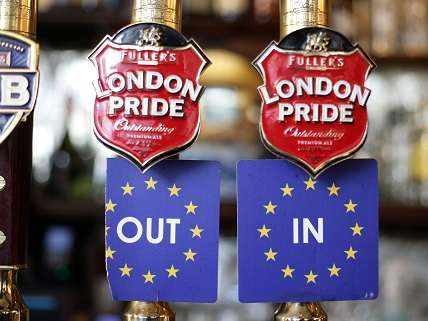Americans Should Welcome a Brexit
Britain leaving the EU isn't a choice for isolationism, it's a chance to embrace the world.


Today, Britain will vote on the most important decision in its constitutional history: whether to leave the European Union (EU).
Many in the U.S. are probably glad not to have that responsibility, especially given the recent razor thin polling margins. Some Americans worry that a post-EU U.K. could be insular and disengaged. It's understandable—many voices urging a "Remain" vote paint a British EU exit, or "Brexit," as a struggle between enlightened cosmopolitans and inward-looking xenophobes. We're told Brexit will cause catastrophe and recession by an economic establishment with a clear vested interest in Britain's continued EU membership. British Prime Minister David Cameron even claimed that leaving could lead to World War III.
These are the wrong ways for us to think about Britain's choice. It's a once-in-a-lifetime opportunity to free themselves from an ossified, undemocratic power structure. It's a chance for the U.K. to look beyond the continent's economic stagnation and embrace the rest of the world through free trade and fairer immigration. It's also a chance to give other EU members a fighting chance at reforming their system. Americans should embrace all of that.
The European Union uses the lofty rhetoric of international cooperation but functionally deprives Europeans of the ability to determine their own futures. The European Parliament is a legislative body in name only. European Members of Parliament (MEPs) can't actually introduce new laws. Legislation comes from the European Commission. The 28 commissioners, one from each member nation, are appointed separately from its President. Instead of pledging to defend the interests of their home countries, members swear an oath to the European Court of Justice, the EU's Supreme Court. The court can force member states to follow EU laws and regulations their people might reject. Had the American constitutional convention proposed this kind of arrangement in 1789, we'd have rejected it out of hand.
With bureaucratic accountability thrown by the wayside, the European Union is technocracy at its worst. The EU's backbone is its behemoth civil service. It pays over 10,000 employees (more than a fifth of its total) higher salaries than David Cameron. Nobody knows quite how many rules they create--only that the pace is frantic.
An estimate by Vote Leave suggests that the EU regulations over the past decade alone tower as high as Nelson's Column in Trafalgar Square. The rules so meticulously govern everyday life that there's at least 454 referencing bathroom towels. All of this red tape comes at a price. Pro-Brexit think-tank Open Europe estimates that the most burdensome EU regulations cost Britain nearly $50 billion a year in compliance costs. Though the exact burden is debated due to different measurements of EU trade benefits, Remainers ignore the huge opportunity costs Britain forgoes not taking control of its economic destiny.
If Britain left the EU, it would be able to trade more freely with the world than ever before. Free from the EU's collective trade negotiations, Britain can sign agreements with America and other powerhouses like China, and Japan. With nearly a quarter of American foreign corporate assets in the U.K., our politicians would be falling over themselves to take leadership roles in new trade negotiations.
A January report from the U.K.'s Civitas Institute revealed just how much better tinier, non-EU countries have done outside the Union. It found that Switzerland, Singapore, Korea, and Chile all managed to secure trade agreements internationally worth more than twice what the EU has accomplished for its members through its single market and EU-negotiated trade deals. By ceding negotiation power to Brussels, the report argues, Britain gave up trillions in lost years of lower tariffs and higher exports it could have enjoyed. As the planet's 5th largest economy, a post-EU Britain would be well-placed to quickly embrace global free trade instead of limiting itself to the cronyist members' club that is the EU's single market.
Critics fear the European Union is too important to the British economy for it to leave. It's true that the EU is Britain's single largest trade partner, but its importance has declined for decades as technology and globalization make geography less important for business. In fact, the U.K.'s dependency on trade with the EU is at a record low. The EU accounted for under 50 percent of British export destinations for the first time two years ago and has been declining ever since. The EU is stagnating and will likely continue to decline in economic relevance.
Meanwhile, the U.K. would be positioned to retain favorable trade access should it leave. Britain will have at least two years to negotiate its future relationship and can enter from a position of strength. The rest of the European Union sends 16 percent of its exports to Britain, which tops even the U.S. and China as the bloc's single largest trade destination. That's a lot of leverage to help it negotiate beneficial trade terms,
Finally, a Brexit will give the U.K. the chance to choose fairer immigration policies. Remain supporters rightly point out that the U.K. and the rest of the EU have benefitted from the nearly open borders most EU countries have as part of what's known as the Schengen area. Freedom of movement has helped Europeans follow economic opportinitues and create prosperity in the process.
Those who favor remaining in the EU, as well as some Americans, worry that Britain would tighten restrictions after leaving. What they discount is how much the European far right has benefited thanks to having the EU to blame.
Authoritarian, anti-immigrant parties like Golden Dawn in Greece and Jobbik in Hungary win support because people feel disenfranchised by EU mandates and powerless to control their futures. The key to defeating these movements is understanding where they come from.
Perhaps surprisingly, liberals could end up in a stronger position if Britain left the EUand had the freedom to set its own immigration policies, because it would force isolationists to convince people to affirmatively choose to forego the hefty economic benefits of immigration rather than simply railing against an undemocratic status quo.
Politically, liberals would probably have the upper hand. YouGov polling from late 2015 shows strong majorities or pluralities of Britons support free movement not only between the U.K. and the EU, but also with the U.S. and the Commonwealth nations (New Zealand, Australia, Canada). Post referendum, pro-immigration forces from both sides would be a powerful force in shaping Britain's future. After leaving the EU, Britain wouldn't be forced to discriminate against non-EU countries in immigration. It would have the freedom to ease visa and trade restrictions with its Anglosphere cousins. It could even create an Anglosphere free movement zone modeled on the Schengen area. An independent Britain would still have the chance to maintain fairly free immigration links with Europe while expanding those benefits to other areas of the world for the first time.
Thinking about Britain's decision should leave us more hopeful than fearful. Britain can still achieve the benefits of the EU's economic integration without tying itself to a democratically bankrupt political institution content to regulate itself to death. Outside the EU, Britain has the opportunity to embrace freer trade and open the U.K. to more people and prosperity than ever before. That's something to be excited about.


Show Comments (58)